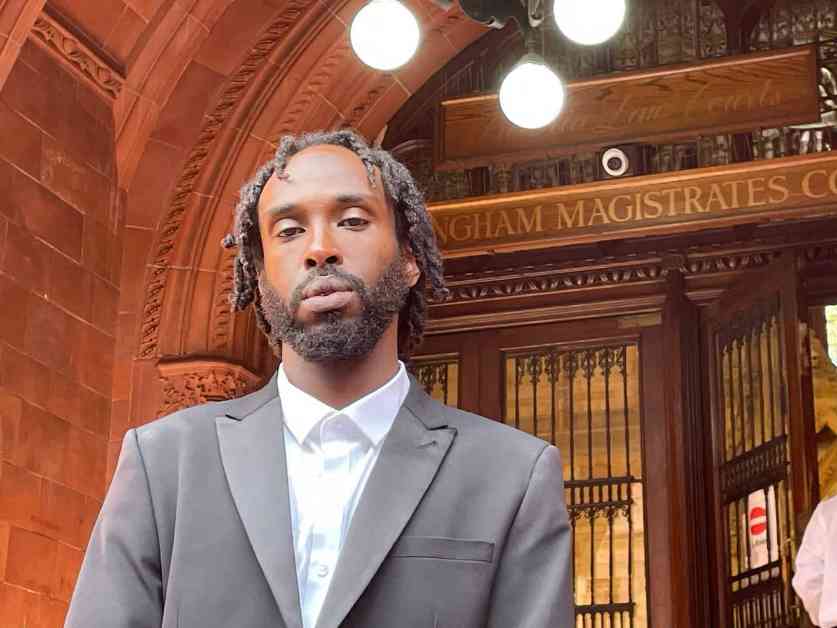Rapper Faces Trial for Allegedly Menacing Video Involving Tommy Robinson
A rapper arrested for allegedly posting a “menacing” video referencing Tommy Robinson, a controversial British political activist, is set to face trial next year after entering a plea of not guilty. Omar Abdirizak, known by his stage name Twista Cheese, appeared in Birmingham Magistrates’ Court where prosecutors dropped a charge of conveying false information and replaced it with an allegation of sending a grossly offensive or menacing message via a public communications network. Abdirizak denied the new charge during the court appearance before District Judge David Wain and was granted bail to await trial on January 8.
The 30-year-old rapper, hailing from Sparkbrook in Birmingham, will have a police officer as the sole witness in the upcoming trial. The case revolves around a video allegedly created by Abdirizak between August 1 and 10, which he then shared on social media. The video gained further attention when Tommy Robinson, whose real name is Stephen Yaxley-Lennon, shared it on X platform, sparking controversy and leading to legal action against Abdirizak.
Background of the Case
The incident began when Omar Abdirizak, a Birmingham-based rapper, released a video that caught the attention of authorities due to its alleged menacing content. Officials claimed that the video contained messages that were deemed grossly offensive or menacing, leading to Abdirizak’s arrest and subsequent legal proceedings. The involvement of Tommy Robinson, a polarizing figure in British politics, added another layer of complexity to the case, drawing public interest and scrutiny.
Tommy Robinson, a prominent activist known for his anti-Islam views and involvement in far-right movements, shared the video created by Abdirizak on a social media platform. This action further amplified the reach and impact of the video, drawing criticism and raising concerns about its content. The decision to pursue legal action against Abdirizak reflects the seriousness with which authorities viewed the video and its potential implications.
Legal Proceedings and Trial
During the court appearance at Birmingham Magistrates’ Court, Omar Abdirizak pleaded not guilty to the charge of sending a grossly offensive or menacing message via a public communications network. The initial charge of conveying false information was dropped by prosecutors in favor of the new allegation. District Judge David Wain granted Abdirizak bail and scheduled the trial for January 8, where a police officer will serve as the key witness.
The upcoming trial will be a crucial moment for Abdirizak as he defends himself against the allegations brought forth by authorities. The legal proceedings will likely delve into the content of the video, the intent behind its creation, and the impact it had on those who viewed it. The involvement of Tommy Robinson in sharing the video adds a layer of complexity to the case, raising questions about the responsibility of individuals in disseminating potentially controversial or offensive content.
As the trial date approaches, both supporters and critics of Abdirizak will be closely following the developments in the case. The outcome of the trial could have far-reaching implications for how individuals navigate the realm of social media and online communication, particularly in relation to the boundaries of free speech and expression. The legal proceedings will provide a platform for examining the intersection of art, activism, and legal responsibility in the digital age.
In conclusion, the trial of Omar Abdirizak, also known as Twista Cheese, for his alleged involvement in creating and sharing a menacing video referencing Tommy Robinson, highlights the complexities of free speech, online communication, and legal accountability in the modern era. The case serves as a reminder of the power and pitfalls of social media, as well as the importance of thoughtful and responsible engagement in digital spaces. As the trial unfolds, it will shed light on the broader implications of this case for individuals, artists, activists, and society as a whole.





















